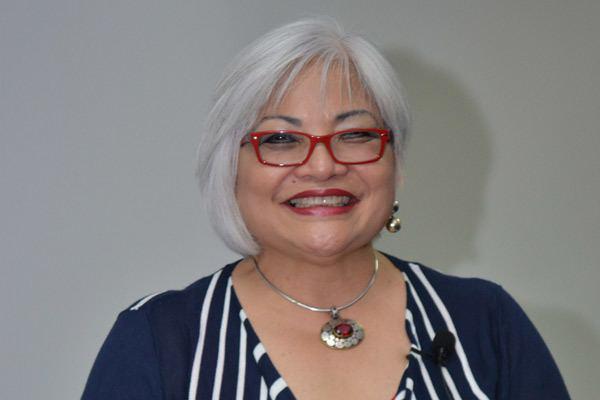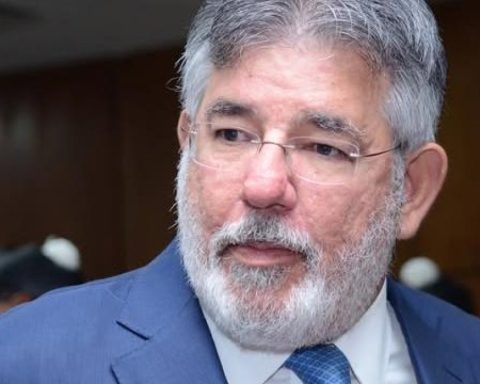The former president of the Dominican Academy of History (ADH), Mukien Adriana Sang Ben, communicated through a letter that she will not participate in any activity carried out by the academy from now on after the election of the General Ramiro Matos González as corresponding member.
“As a citizen, as a teacher, and as a historian, I cannot accept the position of the Board of Directors. History is much more than describing the past. There is an ethical reason that is being ignored. For this reason, I report that from At this time I will not participate in any activity carried out by the Academy”.
Sang Ben questioned: “Why include him (Ramiro Matos) now, when he is a person with a questionable personal history and more than 90 years old?”
Mukien Adriana Sang Ben joined the questions made by Minou Tavárez Miraba and Manolo Tavárez Mirabal, who submitted ten years ago to the General Ramiro Matos González for the murder of the expedition members in June 1959. In a letter, the sons of Manuel Aurelio Tavárez Justo questioned the academy that “the murderer Ramiro Matos González, who is recognized today as a historian, has in his record having participated in the execution of national heroes in chains such as the expedition members of June 1959, having commanded the Army squad that gave, on the scene, the coup de grace to the national hero Francisco Alberto Caamaño Deñó and having directed the patrol that tied up, tortured and assassinated with the greatest cruelty to Manuel Aurelio Tavárez Justo, Manolo, our father, declared by the National Congress through Law 150 of 2004, National Hero of the Dominican Republic, and his companions as Martyrs of the Homeland. Let it be known, when they decided you incorporate it into the Dominican Academy of History, did not question the validity of this law, nor the heroism, nor the patriotism of those heroes with whose Assassin, sit down to deliberate. Or did they?”
Sang Ben pointed out that although the academy statutes indicate “that the candidate has shown dedication and competence in historical studies through works and other academic publications, which constitute valuable contributions to the knowledge of our past.” Of course, nowhere in the letter is there any reference at all to the ethical and moral issue of the candidates.”
However, he stated that “speaking of the need to rescue ethics and morality, in a society that tramples it mercilessly. Yes, this society in which we live, in which “everything is fine” and nothing is nothing. And, above all, Everything, nothing happens, absolutely nothing. Do you know why? Because there is no system of consequences for those who abuse power, or for violators of the laws, or for some beings used by the State to commit crimes.”
Below is the complete letter sent to the history academy:
I have been waiting, since December 2022, for the response from the Board of Directors to the letter sent by the Tavares Mirabal brothers. It came almost three months later.
Without pretending to be an excuse, I was not present at the Assembly in which the General Ramiro Matos González as corresponding member. At the time, I was out of the country.
When I found out about his choice, I thought of two things: why include him now, when he is a person with a questionable personal history and who is over 90 years old?
I understand the legal arguments put forward in the correspondence. My questioning goes beyond these explanations. They affirm, using article 8 of the Statutes, that to be a national corresponding member it is necessary for the candidate to have demonstrated dedication and competence in historical studies through works and other academic publications, which constitute valuable contributions to the knowledge of our past.” Of course, nowhere in the letter is there any reference at all to the ethical and moral issue of the candidates.
So many questions arise to me: What is the function of history? What is the duty of historians? What should be the very role of the Academy? Should we simply be descriptors of reality, of the past, without assuming a critical position on the horrors committed?
I am, in short, talking about the need to rescue ethics and morality, in a society that mercilessly tramples on it. Yes, this society in which we live, in which “everything is fine” and nothing is nothing. And, above all, nothing happens, absolutely nothing. Do you know why? Because there is no system of consequences for those who abuse power, nor for violators of the laws, nor for some beings used by the State to commit crimes.
Fernando Savater in his book “Ethics as self-love” points out that ethics is a voluntary stance that bets on the immortality of humanity whose most elaborate fruit is the autonomous and responsible human being, capable of recognition and participation with his equals. This means that in ethics everything is and must be humanistic.
In ancient Greece, Socrates affirmed that political power should be used for the common good, the Timos, as he called the ethical exercise of power. Plato, on his side, from the depths of his convictions, was critical of democracy and tyranny, and advocated a government of those who know. The structure of the Western State, divided into powers, were products of the brilliant minds of Locke, Rousseau and Montesquieu, who bet on human goodness and suggested ways of exercising power from that perspective. History is littered with examples.
Intellectuals who have joined revolutionary movements to promote them and give them coherence, as was the case with Emmanuel Sieyès, one of the great thinkers of the French Revolution, who was thrown aside by the new political power and sent to the cruelest of the forgetfulness Or Arthur Koestler, who, for being critical of the power of the Bolsheviks, the same power that he helped raise, was sent to jail and torture.
I question and will always question the use of knowledge and economic power only for personal benefit or that of a small group. Here I assume the position of Max Weber, the great German intellectual, who affirmed that the ethics of conviction and the ethics of responsibility should guide our daily actions. The first, the ethics of conviction, establishes that the public behavior of an individual, and not only the private one, must be consistent with his moral convictions. The ethics of responsibility establishes that behavior must weigh the consequences of actions.
Freedom and responsibility are necessarily two sides of the same coin. Assuming the ethics of responsibility is being able to respond freely to external factors and conditioning.
When talking about all this, I think of Azorín, the Spanish intellectual born at the end of the 19th century (1873 –1967).
“El Político”, his best-known work, was written in 1908 and is one of his great legacies. The truths that appear in the work are valid, more than 100 years after they came to light. As before, force, and not reason or love for humanity, is what has been imposed on the world. Honor continues to be a mirage, perhaps also a lie, a big lie.
I think it’s time to ASSUME a different stance towards life. We have the challenge of being spokespersons for Good News: being an example of the current countervalue of BEING, of ETHICS as a rule of life, of constructive criticism against those who mock and accuse us of advocating utopia and deluded ideas.
I advocate for a history, and of course, for historians, critics, who question the facts, who ask themselves questions, who are not satisfied with the simple description of the past. As the historian Joaquín Prats Cuevas rightly says: “History must serve to critically understand one’s own identity and be able to contextualize it in a wide world”
Furthermore, history, and here I am paraphrasing Prats Cuevas, reflects on society, in times past, it is true, but it intends to teach what keys are behind historical processes and phenomena. And what is more important, history has an intrinsic formative value to society and citizenship.
History, says Prats, as an exercise in problem analysis, helps to understand the complexity of the events of any social and political phenomenon; and that any problem or historical process must show its causes and its consequences. Therein lie, as the Spanish historian affirms, his best formative possibilities. In this sense, with the position assumed by the Board of Directors, what are we teaching the new generations? What is important for a historian is simply to rescue the story, and not the role that the character played in that same story?
As a teacher, I always ask myself, I always torment myself, what to say to young people who are making their way in their lives?
What to demand of young people if we adults are not capable of setting an example? What to tell young people if we adults do not teach them what ethical values are?
As a citizen, as a teacher, and as a historian, I cannot accept the position of the Board of Directors. History is much more than describing the past. There is an ethical reason that is being ignored. For this reason, I inform you that from this moment I WILL NOT PARTICIPATE IN ANY ACTIVITY CARRIED OUT BY THE ACADEMY. I don’t feel comfortable or satisfied with that position,
Greetings

















